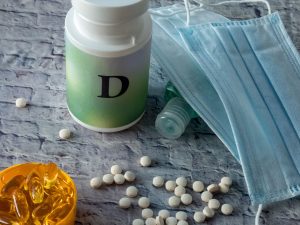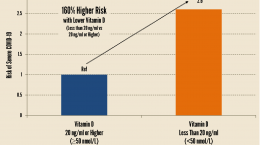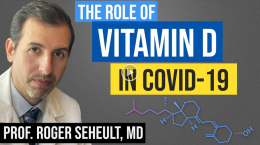Published on October 22, 2021
Recently Released, “700,000 Covid-19 Deaths: Time for a Change in Treatment Strategy”
Key Points
- Vitamin D status is a major and easily modifiable factor that has been shown to reduce the incidence of COVID-19 and improve disease outcomes
- Many studies have demonstrated that COVID-19 disease tends to have a more severe course in patients with vitamin D deficiency, and that correcting deficiency, even after diagnosis, can help protect against death
- A recent press release suggests that “all physicians should be testing all of their Covid-19 patients for this particular nutrient deficiency. And if their Covid-19 patients are vitamin D deficient, they should be treating them accordingly. Based on the previously mentioned statistics, to do otherwise would be negligent.”
- Test your vitamin D level today!
 Vitamin D intake and status has repeatedly been shown to help predict or influence COVID-19 disease risk and outcomes. In fact, many studies have now demonstrated that COVID-19 disease tends to have a more severe course in patients with vitamin D deficiency, and that correcting deficiency, even after diagnosis, can help protect against death.
Vitamin D intake and status has repeatedly been shown to help predict or influence COVID-19 disease risk and outcomes. In fact, many studies have now demonstrated that COVID-19 disease tends to have a more severe course in patients with vitamin D deficiency, and that correcting deficiency, even after diagnosis, can help protect against death.
Simply put, vitamin D status is a major and easily modifiable factor that has been shown to reduce the incidence of COVID-19 and improve disease outcomes. For an up-to-date compilation of all the research we have covered so far on the topic, please visit our webpage titled Reducing COVID-19 Risks and Improving Patient Survival – A Summary of Research on Vitamin D, Other Nutrients & Immune Health.
Visit the COVID-19 and Vitamin D Research Summary Page
Below is a recent press release from the Orthomolecular Medicine News Service on October 17, 2021.
700,000 Covid-19 Deaths: Time for a Change in Treatment Strategy
Commentary by Dwight K. Kalita, Ph.D.
OMNS (Oct. 17, 2021) Tragically, there have been over 700,000 Covid-19 deaths in the United States. Perhaps it is time to consider that in addition to drug therapies, physicians in the United States might also want to use treatments that are based on optimum nutritional support for their patients. For example, in Spain, physicians are treating their Covid-19 patients with high doses of vitamin D, and they have discovered some amazing results. A 76-patient 2020 study in October 2020 discovered that of 50 hospitalized COVID-19 patients who were given oral calcifediol: (0.532 mg, ~20,000 IU, on admission and 0.266 mg, ~10,000 IU, several days thereafter) of vitamin D, only one (2%) needed treatment in the intensive care unit and there were no deaths. In contrast, among the 26-remaining COVID-19 patients who were not given vitamin D, 13 (50%) needed to be treated in the intensive care unit and two died. [1]
Obviously, if vitamin D is given in an optimum dose as well as for an effective period of time, it has potent immune-boosting powers to potentially fight off severe viral respiratory symptoms and even death associated with Covid-19. If it is not given, the results are far more troubling and deadly.
It is important to understand that if you are deficient in vitamin D, that does impact your susceptibility to viral infections as well as your ability to fight them. In fact, a 2021 study of 65 Covid-19 patients compared to a control group concluded that “a vitamin D serum deficiency is associated with more severe lung involvement, longer disease duration and risk of death.” [2]
Regrettably, measurable nutritional deficiencies do indeed exist in Covid-19 patients. For example, in a February, 2021 study of 227 patients who were hospitalized with Covid-19, 102 (45%) had catastrophically depleted vitamin D levels of 12 ng/mL or lower. [3] Vitamin D blood levels should range between 30-70 ng/mL. Some physicians believe that a level between 50-60 ng/mL is optimal. Hence, these 102 Covid-19 patients had extremely low, rickets-inducing vitamin D blood levels. In this same study, a whopping 213 (94%) of them had significantly depleted levels of vitamin D below 30 ng/mL. [3]
Unfortunately, about 42% of the US population is vitamin D deficient. And 60% of nursing home residents as well as 76% of African Americans are deficient in this essential immune-boosting nutrient. Needless to say, all physicians should be testing all of their Covid-19 patients for this particular nutrient deficiency. And if their Covid-19 patients are vitamin D deficient, they should be treating them accordingly. Based on the previously mentioned statistics, to do otherwise would be negligent.
In his book Biochemical Individuality, Roger Williams, Ph.D. explains that we all have unique nutritional requirements. [4] In order for everyone to maintain an optimum blood level of vitamin D, professional testing and additional supplements might be advised. As a nutrition / medical writer for over 40 years, I have learned that many people, including some doctors, are unaware of the important and life-saving link between vitamin D and our susceptibility to viral infections as well as our ability to fight them. Accordingly, it is time for all physicians to realize the very powerful treatment benefits of this essential, often deficient, relatively inexpensive, readily available, and immune-boosting nutrient which Mother Nature has given to us.
(Dwight Kalita, Ph.D., is co-editor of A Physician’s Handbook on Orthomolecular Medicine, in collaboration with Drs. Roger Williams and Linus Pauling.)
References
1. Castillo ME, Costa LME, Barrios JMV, et al. (2020) Effect of calcifediol treatment and best available therapy versus best available therapy on intensive care unit admission and mortality among patients hospitalized for COVID-19: A pilot randomized clinical study. J Steroid Biochem Mol Biol. 203:105751. https://pubmed.ncbi.nlm.nih.gov/32871238
2. Sulli A, Gotelli E, Casabella A, et al. (2021) Vitamin D and Lung Outcomes in Elderly COVID-19 Patients. Nutrients 13:717. https://pubmed.ncbi.nlm.nih.gov/33668240
3. Demir M, Demir F, Aygun B, et al. (2021) Vitamin D deficiency is associated with Covid-19 positivity and severity of the disease. J Med Virol. 93:2992-2999. https://pubmed.ncbi.nlm.nih.gov/33512007
4. Williams RJ (1998) Biochemical Individuality. McGraw-Hill Education. ISBN-13: 978-0879838935
Nutritional Medicine is Orthomolecular Medicine
Orthomolecular medicine uses safe, effective nutritional therapy to fight illness. For more information: http://www.orthomolecular.org
Visit the COVID-19 and Vitamin D Research Summary Page
Test Your Vitamin D Level at Home
 Having and maintaining healthy levels of vitamin D and other nutrients can help improve your health now and for your future. Choose which to measure, such as your vitamin D, selenium with other essential minerals including magnesium and zinc, by creating your custom home test kit today. Take steps to improve the status of each of these measurements to benefit your overall health. You can also track your own intakes, symptoms and results to see what works best for YOU.
Having and maintaining healthy levels of vitamin D and other nutrients can help improve your health now and for your future. Choose which to measure, such as your vitamin D, selenium with other essential minerals including magnesium and zinc, by creating your custom home test kit today. Take steps to improve the status of each of these measurements to benefit your overall health. You can also track your own intakes, symptoms and results to see what works best for YOU.
Enroll and test your levels today, learn what steps to take to improve your status of vitamin D (see below) and other nutrients and blood markers, and take action! By enrolling in the GrassrootsHealth projects, you are not only contributing valuable information to everyone, you are also gaining knowledge about how you could improve your own health through measuring and tracking your nutrient status, and educating yourself on how to improve it.
Help everyone Move Research into Practice with vitamin D and other nutrients! As a special birthday gift to everyone, in honor of the science, we have created a special scholarship fund for anyone to donate to that will go towards helping others participate. Your donation will allow anyone to get help with funding their participation when they need it.
Text-to-give: Text Daction to 44321 to add to our Scholarship Fund.





